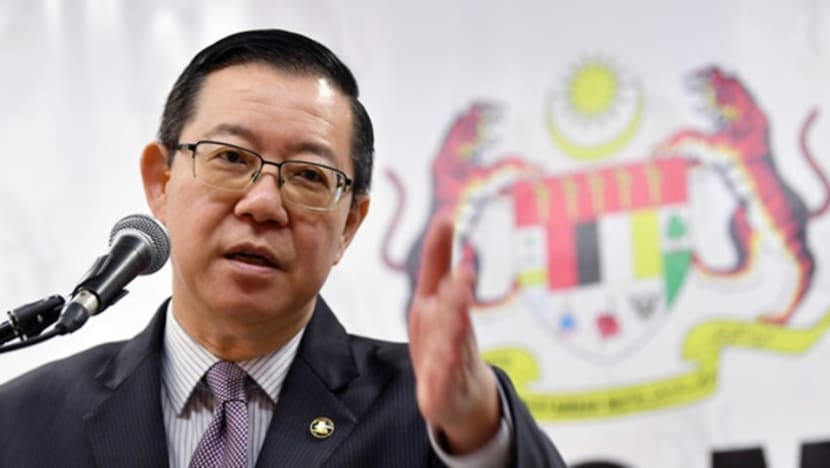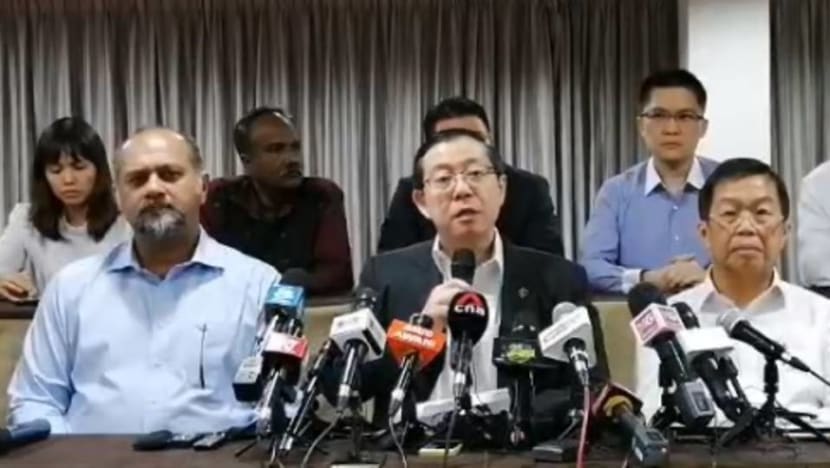Commentary: DAP's political standing at risk amidst Penang turmoil
A widening crisis in the Democratic Action Party’s Penang chapter is drawing the spotlight on a simmering internal leadership struggle and bringing into focus a long-unspoken grouse of dynastic politics, writes CNA's Leslie Lopez.

KUALA LUMPUR: A crisis is roiling the Democratic Action Party (DAP) at its power base in Penang, raising concerns over the political entity’s national standing and influence in Prime Minister Anwar Ibrahim’s Pakatan Harapan (PH) coalition government.
The recent move by DAP leadership to drop the state’s former deputy chief minister Dr P Ramasamy together with four other former state executive councillors from contesting in the Penang assembly elections on Aug 12 has reportedly triggered internal dissent towards party chairman Lim Guan Eng and deputy chairman Gobind Singh Deo.
Apart from the exclusion of the five incumbents, the political crisis rocking Penang stems from plans by Mr Lim and Mr Gobind to shake up the state’s party leadership currently headed by Chief Minister Chow Kon Yeow.
The top two DAP leaders, who are elected parliamentary representatives, do not hold any positions in Mr Anwar’s Cabinet. But they are reportedly planning to take a more direct role in the management of Penang, easily one of Malaysia’s most industrialised states after Selangor.
According to sources close to the party, who spoke to CNA on condition of anonymity because of the sensitivity of the matter, Mr Lim had convinced other DAP officials in the national leadership to field Mr Gobind in the coming state polls with the view of appointing him as the next chief minister.
That controversial proposal to appoint a non-Chinese was, however, nixed a couple of weeks ago because it triggered a hostile reaction within the party and Penang’s majority Chinese community. The Chinese community makes up just under 50 per cent of the state’s voting population, compared with the politically dominant Malays, who account for 39.4 per cent.
DAP’S GRIP OVER PENANG
Penang is the only state in Malaysia where a Chinese has been the leader of the state administration since independence in 1957 and the DAP, which wrested control of the state following the 2008 national elections, has made the state its stronghold ever since.
The behind-the-scenes tensions have eased in recent days following an announcement by DAP secretary-general Anthony Loke that Mr Chow will remain as the party’s candidate for the post of chief minister after the elections. But state DAP leaders expect party conflicts to resurface after the polls over the formation of a new state government.
The Penang assembly election is one of six closely followed state electoral contests that will take place simultaneously on Aug 12. The other states that will go to the polls are PH-controlled Selangor and Negeri Sembilan, together with Kedah, Kelantan and Terengganu that are under the leadership of the opposition right-wing Parti Islam Se-Malaysia (PAS).
The DAP-led coalition, which counts Mr Anwar’s Parti Keadilan Rakyat (PKR) and the United Malays National Organisation (UMNO) as partners in the state, is widely expected to retain power in the upcoming polls. But some serious setbacks are expected, spotlighting voter fatigue over Malaysia’s prolonged political gridlock and growing unhappiness with the DAP leadership and Mr Lim, factors that are likely to contribute to a lower voter turnout.
Before the state assembly was dissolved in late June, the DAP-led PH coalition controlled 30 of the 40 seats in Penang. An overwhelming victory is unlikely this time around and there are concerns that it may not secure a two-thirds majority in the state assembly.
To be sure, DAP’s grip over Penang remains intact.
Even with the expected lower voter turnout, the DAP is expected to win all of the 19 state seats it is contesting because the party remains the only choice among the Chinese voters. PKR is expected to pick up another six seats to give the PH coalition a simple majority to form the state government, while the remaining 15 seats will see tight contests that, at this point, favour the opposition.
UNEASE OVER DYNASTY POLITICS
The DAP was established in 1965 as a multiracial party, but it is predominantly Chinese in composition. It has control of 40 seats in the country’s 222-member parliament and is considered to be an important component party in the PH coalition.
But the current turmoil in Penang has exposed serious internal strife and much of it has to do with growing unease with the unspoken grouses surrounding dynasty politics.
Both Mr Lim and Mr Gobind are the sons of the DAP stalwarts Lim Kit Siang, who has retired from politics, and the late Karpal Singh, respectively. Their siblings are also political players in national and state level politics.
Mr Lim’s sister, Lim Hui Ying, is an elected Member of Parliament (MP) and the deputy minister for education. Mr Ramkarpal Singh Deo, another elected MP, is the deputy minister of the law and institutional reforms. Mr Gobind’s other brother, Jagdeep Singh Deo, is a senior Penang-based politician who will be defending his state assembly seat under the DAP ticket in the upcoming polls.

While the party decided against fielding Mr Gobind to head off a crisis, the internal turmoil lingers.
Mr Satees Muniandy and Mr David Marshel, two Penang DAP incumbent politicians dropped from the list of candidates, have resigned from the party and have declared their candidacy as independents in the upcoming polls.
Mr Lim is facing trial on charges of corruption and the decision by party leadership to field him as a candidate in the state polls has raised consternation among Penang voters. His clout, however, remains formidable.
Of the 19 DAP candidates contesting in the upcoming state polls, the majority of them are considered to be allies of Mr Lim and that in turn could leave current chief minister Chow politically isolated when the new state government is formed.
There is also speculation that any failure by DAP to retain its two-thirds majority could be blamed on Mr Chow’s leadership of the state.
Could Mr Lim, who served as chief minister of Penang between 2008 and 2018, take over the state leadership? It is a prospect that is not being dismissed should his legal woes go away.
Amid all this uncertainty surrounding the party, one thing is certain: The Penang DAP chapter is headed for a bumpy ride.
Leslie Lopez is a senior correspondent at CNA Digital who reports on political and economic affairs in the region.












.jpg?itok=YgE-_kqH)
.png?itok=RyE01mAX)






